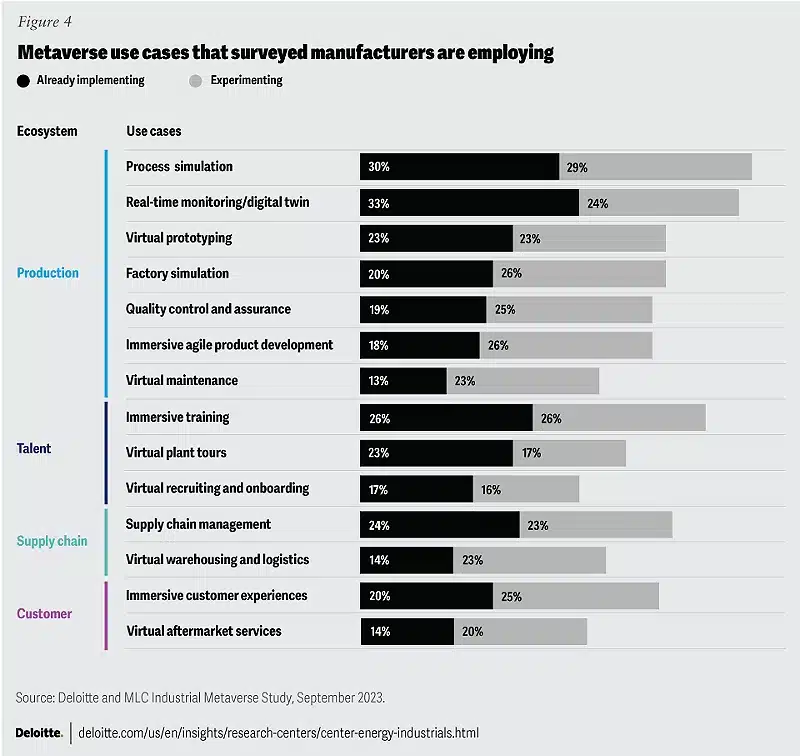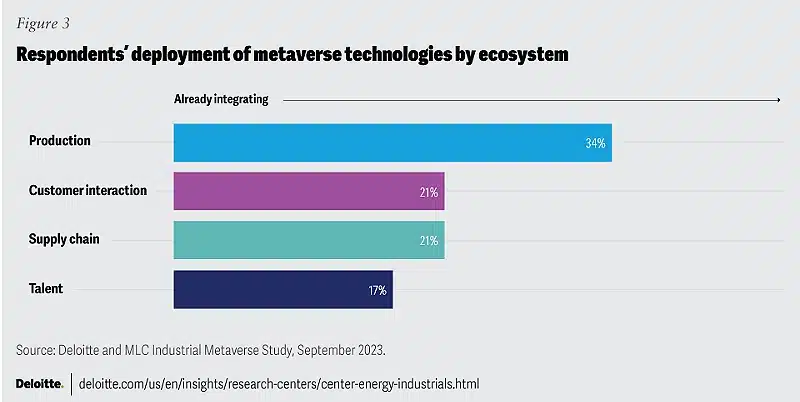Deloitte Survey Reveals 92% of Manufacturers Leveraging Industrial Metaverse


In Brief
Deloitte’s Industrial Metaverse Study shows that 92% of companies surveyed are experimenting with or implementing at least one metaverse use case.
Over 70% of manufacturers expect the industrial metaverse to improve revenue.

Today, Deloitte unveiled the results of its Industrial Metaverse Study that explores the integration of the industrial metaverse in the manufacturing sector. As per Deloitte, “the industrial metaverse is the convergence of different technologies that, when combined, can create immersive three-dimensional virtual or virtual/physical industrial environments.”
The professional services network asserts that as technology progresses, there is a strong likelihood that the industrial metaverse will facilitate access to these immersive 3D environments from any internet-connected device. This encompasses virtual reality (VR) and augmented reality (AR) devices, as well as smartphones, tablets, laptops and various equipment, regardless of geographical location.
“The exponential growth of smart manufacturing in recent years has created a strong foundation for implementation and understanding of the value that metaverse-enabling technologies can bring,” John Coykendall vice chair, Deloitte LLP and U.S. industrial products and construction leader, said in a statement.
Coykendall added that companies embracing tech-forward innovation coupled with agility and adaptability can differentiate themselves and unlock future growth.
The Deloitte study found that 92% of manufacturing companies surveyed are actively experimenting with or implementing various metaverse use cases.
Building on their smart factory efforts and leveraging the foundational technologies already in place, the production ecosystem was the most common for use-case implementation. The report states that more than one-third of respondents are already integrating metaverse technologies, followed by the customer, supply chain, and talent ecosystems.
An independent research firm conducted the survey on behalf of Deloitte and the MLC in May. Over 350 senior executives in the US manufacturing industry participated in the survey. The survey findings were supplemented by a series of executive interviews with technology leaders in the industry conducted in June.

Diverse Applications Across Key Manufacturing Ecosystems
According to Deloitte, the metaverse is not a one-size-fits-all solution; it offers versatile applications across four primary industrial ecosystems:
- Production (34%): Manufacturers are leveraging the metaverse to optimize production processes, enhancing efficiency and precision.
- Customer Interaction (21%): It facilitates immersive customer experiences, strengthening connections and fostering engagement.
- Supply Chain Design (21%): Metaverse technologies are being harnessed for supply chain optimization, ensuring resilience and visibility.
- Talent (17%): Manufacturers are tapping into the metaverse to attract, train, and retain top talent in the digital age.

The company said that manufacturers are bullish on the metaverse’s potential. The survey highlights that 74% of those surveyed anticipate that it will bolster their revenue, while 55% expect cost reductions.
Additionally, the report finds that nearly two-thirds of respondents believe the industrial metaverse will fundamentally reshape business operations, collaboration, and virtual experiences within the next five years. Furthermore, almost 40% of organizations plan substantial growth in their use of metaverse technologies.
Challenges and Risks
While the potential benefits of metaverse-enabled technologies are clear, challenges and risks are on the horizon. Key hurdles include:
- Implementation Cost (51%): Managing expenses associated with metaverse adoption.
- Talent Shortage (50%): Acquiring and retaining talent with the requisite digital skills.
- Integration (45%): Seamlessly integrating metaverse technologies with existing platforms.
- Cybersecurity also emerges as a paramount concern, with 72% of respondents highlighting it as a top potential risk. However, manufacturers appear confident that the value delivered by the industrial metaverse outweighs cybersecurity risks, especially with robust mitigation strategies in place.
Last November, Renault launched the world’s first industrial metaverse. However, not all industrial metaverse experiments yield positive outcomes. For instance, Microsoft decided to discontinue its industrial metaverse project after just four months, in February.
Disclaimer
In line with the Trust Project guidelines, please note that the information provided on this page is not intended to be and should not be interpreted as legal, tax, investment, financial, or any other form of advice. It is important to only invest what you can afford to lose and to seek independent financial advice if you have any doubts. For further information, we suggest referring to the terms and conditions as well as the help and support pages provided by the issuer or advertiser. MetaversePost is committed to accurate, unbiased reporting, but market conditions are subject to change without notice.
About The Author
Cindy is a journalist at Metaverse Post, covering topics related to web3, NFT, metaverse and AI, with a focus on interviews with Web3 industry players. She has spoken to over 30 C-level execs and counting, bringing their valuable insights to readers. Originally from Singapore, Cindy is now based in Tbilisi, Georgia. She holds a Bachelor's degree in Communications & Media Studies from the University of South Australia and has a decade of experience in journalism and writing. Get in touch with her via cindy@mpost.io with press pitches, announcements and interview opportunities.
More articles

Cindy is a journalist at Metaverse Post, covering topics related to web3, NFT, metaverse and AI, with a focus on interviews with Web3 industry players. She has spoken to over 30 C-level execs and counting, bringing their valuable insights to readers. Originally from Singapore, Cindy is now based in Tbilisi, Georgia. She holds a Bachelor's degree in Communications & Media Studies from the University of South Australia and has a decade of experience in journalism and writing. Get in touch with her via cindy@mpost.io with press pitches, announcements and interview opportunities.





















































